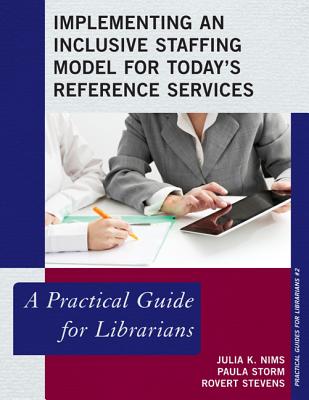Reference service remains a core function of modern libraries. However, how and where we provide assistance has evolved with changing technologies and the shifting habits and preferences of our users. One way libraries can provide the on-demand, in-person assistance while managing and developing new services and resources that will benefit current and future users is to reconsider how their reference points and services are staffed and adopt a staff-based reference model.The authors, staff members at Eastern Michigan University, chose to address this by implementing an inclusive reference model in which staff and student assistants are trained to answer certain levels of reference questions while working at the reference desk and at other service points. The result was that librarians became more available to work with students who needed in-depth assistance and users were able to get simple questions answered throughout the library. Similar training for all staff and student assistants who work in the library results in better service, more accurate answers, and improved interdepartmental communication.In Implementing an Inclusive Staffing Model for Today''s Reference Services, they describe step-by-step how to transition from the traditional librarian-staffed reference desk to an inclusive reference model where non-MLS personnel are equipped and empowered to answer reference questions wherever these questions might be asked. Users ask questions of staff at all service points, not just at the Reference Desk. It is vitally important that those who work at circulation, periodicals, maps, archives and other public service points be trained in how to answer certain reference questions. When this is accomplished, users who have simple questions will not have to make useless treks to the Reference Desk.Topics covered include:·Recognizing that nearly all staff answer reference questions, but few are trained to do so·documenting the necessity for a change in reference model·gaining buy-in from all interested parties—librarians, non-MLS staff, and administrators·determining the optimal staffing level·creating training materials and schedules·monitoring the quality of reference service ·supervising staff·evaluating the new model using multiple methodsAdditionally, each chapter contains practical resources such as checklists, forms, and sample materials, and other usable features to support readers as they implement the inclusive reference model. The book describes in detail the process of transforming traditional reference into a model that transcends departmental and job title boundaries, is focused on the user, and allows librarians to better utilize their time and talents, and include non-professional staff in their reference services.
Reference service remains a core function of modern libraries. However, how and where we provide assistance has evolved with changing technologies and the shifting habits and preferences of our users. One way libraries can provide the on-demand, in-person assistance while managing and developing new services and resources that will benefit current and future users is to reconsider how their reference points and services are staffed and adopt a staff-based reference model. The authors, staff members at Eastern Michigan University, chose to address this by implementing an inclusive reference model in which staff and student assistants are trained to answer certain levels of reference questions while working at the reference desk and at other service points. The result was that librarians became more available to work with students who needed in-depth assistance and users were able to get simple questions answered throughout the library. Similar training for all staff and student assistants who work in the library results in better service, more accurate answers, and improved interdepartmental communication. In Implementing an Inclusive Staffing Model for Today's Reference Services, they describe step-by-step how to transition from the traditional librarian-staffed reference desk to an inclusive reference model where non-MLS personnel are equipped and empowered to answer reference questions wherever these questions might be asked. Users ask questions of staff at all service points, not just at the Reference Desk. It is vitally important that those who work at circulation, periodicals, maps, archives and other public service points be trained in how to answer certain reference questions. When this is accomplished, users who have simple questions will not have to make useless treks to the Reference Desk. Topics covered include:·Recognizing that nearly all staff answer reference questions, but few are trained to do so·documenting the necessity for a change in reference model·gaining buy-in from all interested parties—librarians, non-MLS staff, and administrators·determining the optimal staffing level·creating training materials and schedules·monitoring the quality of reference service ·supervising staff·evaluating the new model using multiple methodsAdditionally, each chapter contains practical resources such as checklists, forms, and sample materials, and other usable features to support readers as they implement the inclusive reference model. The book describes in detail the process of transforming traditional reference into a model that transcends departmental and job title boundaries, is focused on the user, and allows librarians to better utilize their time and talents, and include non-professional staff in their reference services.
Get Implementing an Inclusive Staffing Model for Today's Reference Services by at the best price and quality guranteed only at Werezi Africa largest book ecommerce store. The book was published by Bloomsbury Publishing Plc and it has pages. Enjoy Shopping Best Offers & Deals on books Online from Werezi - Receive at your doorstep - Fast Delivery - Secure mode of Payment
 Jacket, Women
Jacket, Women
 Woolend Jacket
Woolend Jacket
 Western denim
Western denim
 Mini Dresss
Mini Dresss
 Jacket, Women
Jacket, Women
 Woolend Jacket
Woolend Jacket
 Western denim
Western denim
 Mini Dresss
Mini Dresss
 Jacket, Women
Jacket, Women
 Woolend Jacket
Woolend Jacket
 Western denim
Western denim
 Mini Dresss
Mini Dresss
 Jacket, Women
Jacket, Women
 Woolend Jacket
Woolend Jacket
 Western denim
Western denim
 Mini Dresss
Mini Dresss
 Jacket, Women
Jacket, Women
 Woolend Jacket
Woolend Jacket
 Western denim
Western denim
 Mini Dresss
Mini Dresss






























































